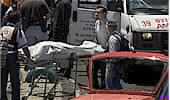MOSCOW (Reuters) - Russia hopes to build a partnership with NATO which would give it an equal voice on key issues with other members of the Alliance, Foreign Minister Igor Ivanov said in an interview broadcast on Sunday.
Ivanov told RTR state television after NATO Secretary General George Robertson's visit to Moscow last week that any arrangement to upgrade Moscow's relations with NATO implied that the opinions of all participants would be taken into account. (Read photo caption below)
But he said Moscow would not use any body replacing the existing NATO-Russia forum to ``torpedo'' NATO activities.
``If we are building up relations of partnership, the opinion of one's partner must be taken into account,'' he said in the interview, recorded on Saturday.
``Within NATO's framework, all decisions are taken unanimously. We assume that if we create a mechanism not based on today's 19 plus one, but a mechanism of 20, the opinions of all, including of course Russia, must be considered...''
Ivanov said Russia was committed to the U.S.-led campaign against terrorism launched after the September 11 attacks on U.S. landmarks and would help fight the ``new threats and challenges'' of drugs trafficking and organized crime.
``We therefore see it as vital to boost the partnership and not use the right of veto on this or that issue or torpedo the activities of this or that organization,'' he said.
Creation of a mechanism to replace the ``19 plus one'' NATO-Russia forum established in 1997 was one of the central themes of Robertson's Moscow talks. Such a proposal now appears to be under consideration, after British Prime Minister Tony Blair first suggested the formation of a body with a mandate to discuss terrorism and certain ``soft security areas.''
Robertson told the BBC at the weekend that there were areas in which a consensus of Russia and NATO members was desirable.
But NATO could continue to act on the basis of decisions by its 19 member states, he said, and the Alliance reserved the right to criticize Russian policy -- on its conduct of the conflict in Chechnya, for instance.
The Permanent Joint Council set up in 1997 when NATO was undertaking its first expansion provides for monthly meetings between NATO and Russia. But the ``19 plus one'' format contains no principle of consensus and therefore lacks political clout.
PHOTO CAPTION:
NATO Secretary General Lord Robertson and Russian President Vladimir Putin, right, speak during a meeting Friday, Nov. 23, 2001. Putin thanked Robertson for his work to strengthen the relationship between Moscow and the western alliance, and he praised the dynamic tempo of discussions to transform a decades-old rivalty into a partnership. (AP Photo/ Yuri Kochetkov, pool)
- Nov 23 8:08 AM ET
- Author:
Reuters - Section:
WORLD HEADLINES


 Home
Home Discover Islam
Discover Islam Quran Recitations
Quran Recitations Lectures
Lectures
 Fatwa
Fatwa Articles
Articles Fiqh
Fiqh E-Books
E-Books Boys & Girls
Boys & Girls  Women
Women










